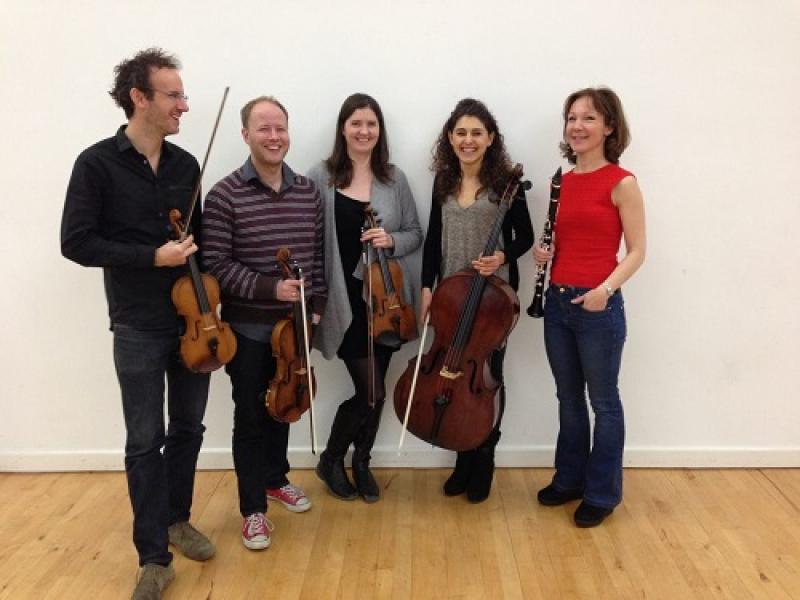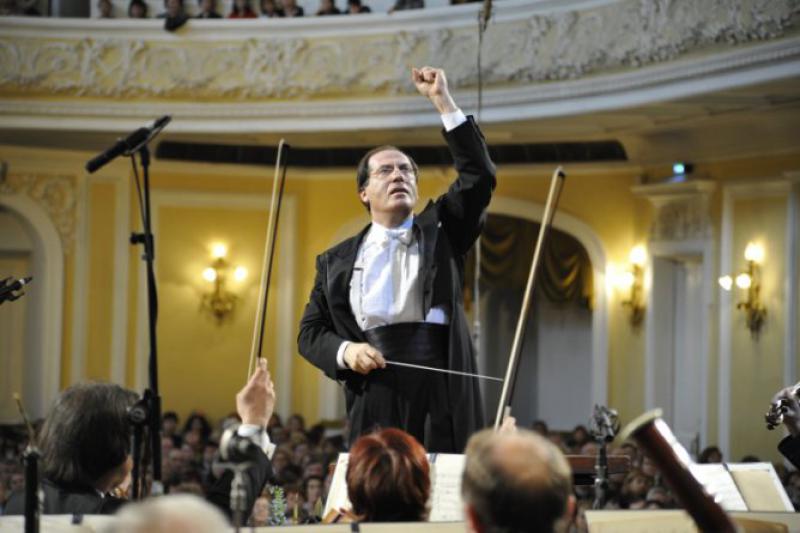May 17, 2019 | Book Reviews, Reviews
BY NICHOLAS CANNARIATO for npr.org

Dmitri Shostakovich, Russian composer-member of the Soviet delegation to the Cultural and Scientific conference for World Peace, plays the second movement of his Fifth Symphony at Madison Square Garden in New York City on March 27, 1949.
Marty Lederhandler/AP
Many years ago, a relative of mine used the term “music-intense” in conversation to describe a musician we both knew.
I think it’s also an apt descriptor for BBC music broadcaster Stephen Johnson. His remarkably diverse aesthetic and personal sensitivity are on full display in his new book How Shostakovich Changed My Mind.
Johnson’s primary focus is Dmitri Shostakovich’s music and how it relates to his personal struggle with mental well-being and a challenging family dynamic. Almost right away, he addresses what I wondered when I first stumbled upon the book: Why Shostakovich, of all composers, to buoy him in troubled times? After all, the the 20th-century Russian composer who made his art under the Soviet shadow — is best known for music that is often grim, intense, brooding, knotty, and heavily serious, though, it should be said, not without many moments of humor and formal nose-thumbing.
Johnson writes candidly about how Shostakovich took him to places inside himself that were seemingly impossible to access without music. It was the complex dark passion of so much of Shostakovich’s music that made that difference for him. And he’s not the only one. He relates that as part of a trip to Russia to make a radio documentary for the centenary of the composer’s birth; he interviews Viktor Kozlov, a clarinetist and one of the few surviving members of the orchestra that originally performed Shostakovich’s epic Seventh Symphony in war-torn Leningrad in 1942, a work that became known by the city’s name. Johnson relates just how meaningful the performance was to beleaguered and brutalized Soviet citizens living under Nazi siege.
Read More…
May 1, 2019 | Book Reviews, Reviews
By Norman Lebrecht
In August 1942, with emaciated corpses littering the streets and German guns booming all night long, Joseph Stalin decided that what Leningrad needed most was to hear the seventh symphony of Dmitri Shostakovich. The thunderous work had been premiered a few months before in Kubyshev, a city in Russia’s interior to which the composer had been evacuated. The symphony had already been heard in Britain and the U.S. in broadcast performances conducted by Henry Wood and Arturo Toscanini. Bring it to Leningrad under German siege would be both an act of defiance and a triumph of propaganda.
The city’s radio orchestra filled out its ranks with music teachers, ex-players and amateurs. The concert, conducted by Karl Eliasberg on Aug. 9 – the day Hitler had designated for Leningrad’s surrender – was beamed at the German army through giant loudspeakers. Hearing the music, a German officer is supposed to have muttered: “We’ll never beat these people.” Although the siege lasted another 18 months, Leningrad held out until the Germans were pushed back.
Roughly 60 years later, Stephen Johnson, a BBC journalist, interviews the clarinet player in that Leningrad performance, Viktor Kozlov, asking him what he felt when he heard the Leningrad symphony today. Kozlov, with his wife alongside him, burst into tears. “It’s not possible to say,” he sobs.
Read More…

Mar 2, 2019 | Angel's Arc Reviews, Reviews
Johnson, Carducci Quartet, Warwick Arts Centre review – new work with well-loved quintets
A beautiful contemplation by Stephen Johnson sits alongside Mozart and Brahms
By Miranda Heggie
There are those who say, somewhat cynically, that a way for new music to get an audience is to present it carefully packaged up with standard repertoire that will draw a larger crowd. How true that may be is open to debate, but composer Stephen Johnson did introduce his new piece – which was sandwiched between Brahms’s and Mozart’s clarinet quintets, as “the moment you’ve all been dreading”.
The work – Angel’s Arc – is a beautiful, contemplative piece of music that explores sorrow, loss and gratitude from memories of Johnson’s own life. It is named after an area of the West Pennine Moors called Anglezarke, which Johnson had been erroneously led to believe had been given its title from Protestant refugees fleeing the Spanish Netherlands. The fact this turned out not to be true didn’t stop the idea of a people finding sanctuary and being thankful for this place from dwelling in the composer’s mind, and as he says himself in his programme note “many of the most useful poetic ideas have their origins in a mistake”.
Read More…
May 17, 2016 | Behemoth Dances Reviews
by David Truslove
It was the Anvil’s turn on Sunday night to host the Moscow State Symphony Orchestra as part of their UK tour under their Musical Director Pavel Kogan. Kick-starting the evening was a new work by BBC Radio 3 broadcaster and musicologist Stephen Johnson – Behemoth Dances – which received its UK première last week at the Cadogan Hall.
Read More…

May 17, 2016 | Behemoth Dances Reviews
by Richard Bratby
Behemoth Dances. Who dances? You know, Behemoth, the huge demonic black cat who cakewalks through Stalin’s Moscow in Bulgakov’s The Master and Margarita spreading mayhem and magic; the spirit – as quoted by Bulgakov, and taken by Stephen Johnson as a sort of motto for his new orchestral work – “that always wills evil, but always does good”. A sardonic fanfare announces his appearance, before the orchestra whizzes away on a bustling, bristling spree. Woodwinds squeal and skirl, the surface glitters, and a piano throws in a few deadpan comments.
Read More…
May 16, 2016 | Behemoth Dances Reviews
by Christopher Morley
Stephen Johnson is a much respected presenter and writer about music. As we discovered in Saturday’s concert from the remarkable Moscow State Symphony Orchestra he is also an accomplished composer. Behemoth Dances’ bristling energy was generously conveyed by the MSSO under Pavel Kogan’s empowering baton.
Read More…
May 12, 2016 | Behemoth Dances Reviews
by Colin Anderson
As part of the Zurich International Series, the Moscow State Symphony Orchestra and long-standing music director Pavel Kogan arrived at Cadogan Hall and launched straight into a UK premiere, Behemoth Dances by Stephen Johnson (born 1955), best-known as a writer and broadcaster on music, a familiar voice on BBC Radio 3. If not Johnson’s primary occupation, his interest in composing goes back to his teenage years and has had the tutelage of Alexander Goehr and Robert Simpson. Behemoth Dances is “named after Bulgakov’s magnificent cat-demon Behemoth [from the novel, The Master and Margerita], who wreaks such havoc in Stalin’s Russia, yet whose pranks prove to be strangely redemptive for a few privileged souls.”
Read More…
Jan 20, 2008 | Discovering Music Reviews
by Nicholas Lezard
I sometimes think that the postures of the lady which summarise the judgement of the critic she’s sitting on top of in this newspaper do not allow for a full range of expression. There should, for instance, be one of her putting a gun to her head; and, at the other end of the scale, something more ecstatic than standing up and applauding. Perhaps raising a glass of champagne, or taking all her clothes off and running around the room with wild abandon.
Read More…
Dec 26, 2007 | Book Reviews, Reviews
by Michael Tumelty, The Glasgow Herald
Naxos has fashioned two superbly useful products out of all this. Both feature the writer and broadcaster Stephen Johnson, who, for many, is the authoritative British voice of classical music (pace James Naughtie and Charles Hazlewood).
Read More…
Oct 1, 2007 | Discovering Music Reviews
by Robert Hanks
Stephen Johnson’s analysis of Beethoven’s Fifth was far more – combative, occasionally funny, verging on the poetic.Johnson (who also presents Discovering Music on Sunday afternoons) has an unrivalled ability to talk about the technicalities of music in terms of feeling: he calls attention to details of orchestration – a winding melody on an oboe, a pounding on a timpani – and shows how they contribute not just a texture but an emotion, a meaning; how different tunes or figures in a piece relate to one another to create a narrative and a sense of structure.
Read More…



